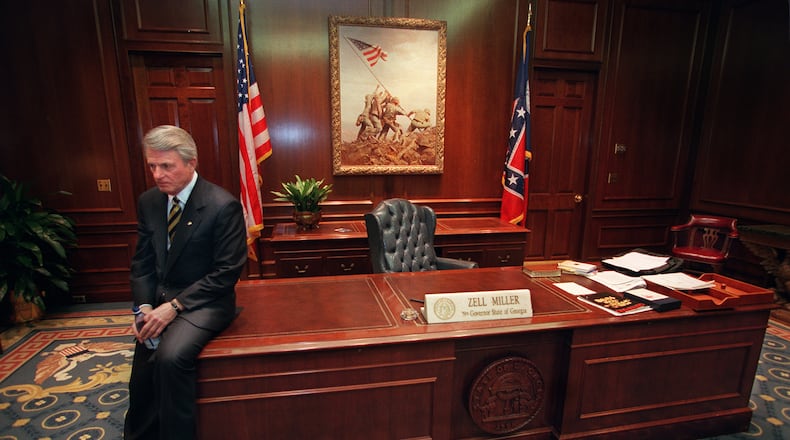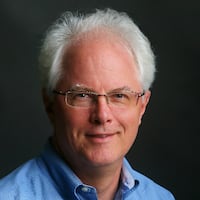From 1994 to 1996, I covered Gov. Zell Miller for The Atlanta Journal-Constitution, first when he was a candidate seeking re-election and then as a second-term governor at the Capitol.
I spent long days trailing him around the state, in his campaign van or by state plane, and at least once by National Guard chopper during floods in central Georgia. At the Capitol, I never knew when my pager might chirp with a summons to Miller’s second-floor office.
At first, the relationship was an uneasy one. In those days, the AJC distributed to every corner of Georgia, and Miller knew that what I wrote about him could influence what people thought. I knew this, too, and as a result understood that he was never telling me everything.
But over time we grew to like and trust one another, and I caught glimpses of the complex man behind the mountain twang. I learned what he really cared about, and what he simply said to please an audience. I saw his temper and how hard he worked to control it. I came to appreciate his poetic turns of phrase and sense of humor, which ranged from the goofy to the urbane.
And I also came to understand how important his wife Shirley was to him and his political career. Shirley steadied Miller, quieted his bouts of anger. I’m convinced Miller wouldn’t have been half the politician he was without Shirley there to ground him.
Miller will rightly be remembered as the education governor, the man who gave Georgia HOPE. Education was deeply personal to Miller. His mother and father were educated and taught school.
But the poverty of his North Georgia mountains was what really motivated him to improve education in Georgia. He’d lived through the devastating impact of the Great Depression in a region where opportunities were already scarce.
In the Legislature, the national school rankings that came out year after year showing Georgia near the bottom insulted his pride and fueled his determination to take bold action.
He believed HOPE could lift Georgia and Georgians out of the cellar, giving high school students an incentive to stay in school, and their parents the financial means to send them to college.
Miller needed money to fund HOPE, lots of it, and considered a statewide lottery a stroke of genius. He knew that the days of raising taxes to pay for government programs were over, at least in Georgia anyway, and he saw the lottery as a way around that problem.
HOPE was Miller’s singular achievement during his first term, and he was convinced that the extraordinary benefit of the program – free college tuition for any student with a B average, regardless of income – would ultimately prove persuasive to voters in his 1994 re-election campaign.
On the campaign trail, Miller delivered the same stump speech over and over again, extolling the benefits of HOPE and the promise of a college education.
After one event in South Georgia, he caught me rolling my eyes.
“I know you’ve heard it a thousand times,” he said. “But they haven’t.”
Miller’s favorite restaurant on the road was Waffle House and, as an early riser, he liked to have lunch on the table by 11:30 a.m.
During the 1994 campaign, he was mildly perturbed that Waffle House founder Joe Rogers was backing his opponent, a wealthy Atlanta businessman named Guy Millner with no political experience.
So Miller wrote to Rogers about how much he liked eating and spending money in Rogers’ restaurants and wondering, in light of that, if Rogers would reconsider his support for Guy Millner.
He seemed genuinely disappointed when he didn’t get a response.
One night, Miller called my home and my wife accurately conveyed that I was out walking our dog.
Miller thought that was hilarious and for years might look up at me at some event and say, “Ken, you still walking that dog?”
Before a business trip to Europe, he feigned nervousness about whether he might embarrass the state of Georgia with his simple mountain ways at official dinners in France.
Before he left, I gave him a can of Van Camp’s beans (a favorite, if I recall) in case French food proved too fancy. Before his return, I received a postcard in the mail assuring me that he had acquitted himself admirably – and stuck his fork in his eye only once.
In 1996, I moved to Washington to cover Congress for the AJC. Our paths overlapped again after Gov. Roy Barnes appointed Miller to serve out the term of Paul Coverdell.
I never said anything to Miller, but I knew that he would not like Washington. Miller was a doer, and Washington had become a hard place to get things done.
In 2004 when Miller delivered his fiery speech to the Republican convention, I’d pretty much lost touch with him. For me, his about-face was a last-ditch effort to remain relevant in a political landscape that had shifted beneath him.
I could be wrong, but I suspect that as time goes by, Americans will remember Zell Miller not for what he said, but for what he did.
About the Author
Keep Reading
The Latest
Featured





